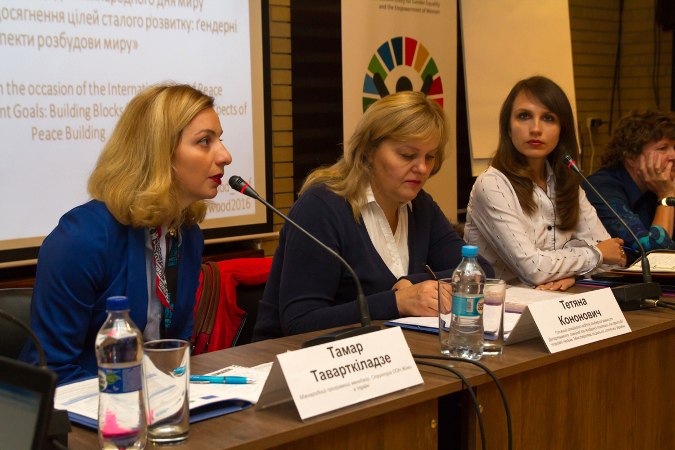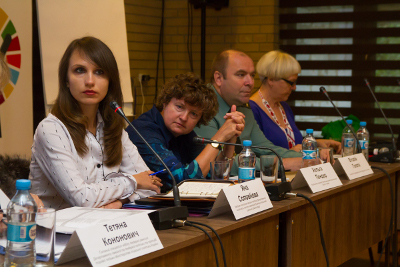To build peace in Ukraine, more women decision-makers needed
On International Peace Day, national and local government representatives meet with women’s groups to discuss enhancing women’s participation in local decision-making and the peace process.Date:

On 21 September, International Peace Day, UN Women and Ukraine’s Ministry of Social Policy brought together in Svyatogirsk, Donetsk region 40 representatives of the Luhansk and Donetsk oblast administrations, national government, civil society organizations and women’s groups for practical consultations on the problems faced by internally displaced women and men from conflict-affected communities in Donbas – Ukraine’s eastern regions of Donetsk and Luhansk.
The conflict has directly affected at least 3.9 million of Donbas’ 5.2 million people and had a significant negative impact on human welfare and social and economic conditions, particularly for women.
“As a result of the on-going conflict in the Eastern Ukraine, women became solely responsible for the wellbeing of their families. To increase the wellbeing of all, it is very important to support women’s increased participation in policy development and decision-making,” said Ms. Helga Pender, Project Coordinator of the EU Delegation to Ukraine.
Participants examined ways to promote women’s participation in local decision-making and meet the objectives of Ukraine’s National Action Plan (NAP) 1325, which aims to boost local decentralization and assist internally displaced populations (IDPs) and conflict-affected communities.
Emphasizing the importance of women’s active participation in on-going reform, UN Women International Programme Manager Ms. Tamar Tavartkiladze said: “UN Women is strongly committed to support the active involvement of women activists in their communities’ local development and decentralization processes.”
Adopted in February 2016, NAP 1325 is based on UN Security Council Resolution (USSCR) 1325 on Women, Peace and Security, which requires parties in a conflict to prevent violations of women's rights, support women's participation in peace negotiations and post-conflict reconstruction, and protect women and girls from sexual and gender-based violence in armed conflict.

The event’s regional focus was a unique opportunity for Donetsk and Luhanks Oblast representatives to meet with central authorities and share information.
“Organising this event with a local perspective helps all to see the region’s problems from inside. Although Donetsk and Luhansk regions are close neighbours, we don’t necessarily face the same problems,” said Ms. Yana Solovyova, Head of Family Policy, Social Protection Department, Luhansk Regional Administration.
Participants agreed that inter-agency cooperation and setting up regional gender coordination mechanisms to enhance women’s participation in local decision-making were critical to implement NAP 1325. Key on-going challenges to achieving these goals included:
- A lack of human and economic security
- Increased risks of gender-based violence
- Limited access to services and information
- Insufficient gender equality focus in local policies and budgets.
The event was organized as a part of the UNDP-UN Women Joint Programme on Restoration of Governance and Reconciliation in Crisis-Affected Communities of Ukraine, funded by the European Union.
Ukraine’s on-going decentralization and good governance reform makes possible increased participation by local women’s groups in decision-making. Women’s groups, however, say they face substantial obstacles, including poor cooperation from national and local governments in analysing needs and setting priorities.
Women are underrepresented in Ukraine politics at all levels. This prevents women from engaging in political leadership and excludes them from policy making. In the 2015 local elections, women won only 18 per cent of local city council seats and 15 per cent of oblast council seats. No woman was elected mayor.
“Each country can be judged by the role its women play in society. Ukraine still has a long way to go for gender equality. We need to develop effective mechanisms to prevent gender-based violence throughout the Ukraine,” said Mr. Igor Stokoz, Deputy Head of Donetsk Regional State Administration.